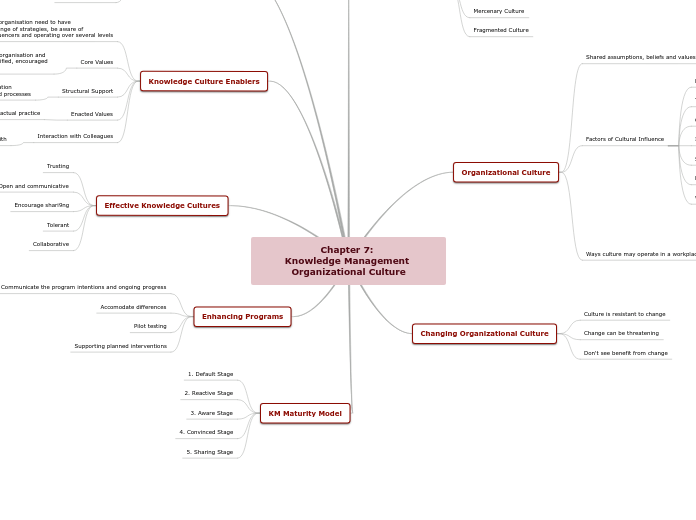Chapter 7:
Knowledge Management Organizational Culture
Typology of Cultures
Sociability
measure of friendliness
Solidarity
measure of task orientation
Communal Culture
Networked Culture
Mercenary Culture
Fragmented Culture
Organizational Culture
Shared assumptions, beliefs and values
Factors of Cultural Influence
Past patterns & history
Teamwork
Climate & morale
Information flows
Supervision quality
Leadership
Workplace interactions
Ways culture may operate in a workplace
Regulator
Compass
Social Glue
Sacred Cow
Changing Organizational Culture
Culture is resistant to change
Change can be threatening
Don't see benefit from change
Analysis of
Organizational Culture
Artifacts
Expoused values
Basic assumptions
and values
Knowledge Culture Enablers
An organisation need to have
a range of strategies, be aware of
influencers and operating over several levels
Core Values
Essential to the organisation and
need to be identified, encouraged
and monitored
Structural Support
Describe the organisation
structure, system and processes
Enacted Values
Values which are reflected in actual practice
Interaction with Colleagues
Individual influneced by
whom they regularly work with
Effective Knowledge Cultures
Trusting
Open and communicative
Encourage shari9ng
Tolerant
Collaborative
Enhancing Programs
Communicate the program intentions and ongoing progress
Accomodate differences
Pilot testing
Supporting planned interventions
KM Maturity Model
1. Default Stage
2. Reactive Stage
3. Aware Stage
4. Convinced Stage
5. Sharing Stage
